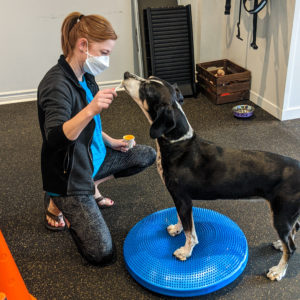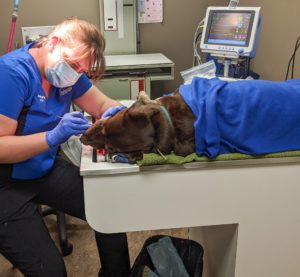There is something about a senior pet. They may not have the attention-grabbing cuteness of puppies or kittens but there is a quiet beauty in an old soul. After years by your side there is a comfort and a bond that is hard to even put into words.
At Gateway Pet Hospital, November is one of our favourite months, as we get to celebrate those amazing senior pets. We have a great passion for making sure those golden years are, in fact, golden. We want their lives to be mentally and physically comfortable for as long as possible.
We can accomplish this by first focusing on the fact that age is NOT a disease. Our pets do not slow down or develop significant personality changes simply because they are getting old. They are likely slowing down because of a specific medical condition, often ones that we can help to prevent or treat, especially when it's addressed early! Some of the most common conditions affecting our senior pets include: osteoarthritis, dental disease, and cognitive dysfunction.
Osteoarthritis
 Osteoarthritis is the most common affliction for pets, affecting both small and large dogs as well as cats. Arthritis can be the result of joint abnormalities during development (such as hip or elbow dysplasia), acute injuries (such as a broken bone or torn ligament), or repeated joint stress over time. Arthritis is best if it's identified and treated early on but this can be difficult as the signs may be subtle. Often the first signs of arthritis is a dog or cat showing reluctance to perform tasks they used to perform seemingly effortlessly. This may mean hesitation to jump up or down from the couch or slowing down on walks when the distance did not previously cause trouble. It may even start with seemingly unrelated changes such as irritability (or even aggression) when being handled or approached, or urinating outside the litterbox. The good news is that there are a number of options available to help manage osteoarthritis. These options may include physiotherapy, weight management, joint supplements, nutritional supplements or pharmaceutical pain control. If you are concerned that your pet may be experiencing joint pain, we can help. A helpful tip for your pet's exam: take a video of your pet when the change is most noticeable. Multiple angles and slow-motion video is even more helpful!
Osteoarthritis is the most common affliction for pets, affecting both small and large dogs as well as cats. Arthritis can be the result of joint abnormalities during development (such as hip or elbow dysplasia), acute injuries (such as a broken bone or torn ligament), or repeated joint stress over time. Arthritis is best if it's identified and treated early on but this can be difficult as the signs may be subtle. Often the first signs of arthritis is a dog or cat showing reluctance to perform tasks they used to perform seemingly effortlessly. This may mean hesitation to jump up or down from the couch or slowing down on walks when the distance did not previously cause trouble. It may even start with seemingly unrelated changes such as irritability (or even aggression) when being handled or approached, or urinating outside the litterbox. The good news is that there are a number of options available to help manage osteoarthritis. These options may include physiotherapy, weight management, joint supplements, nutritional supplements or pharmaceutical pain control. If you are concerned that your pet may be experiencing joint pain, we can help. A helpful tip for your pet's exam: take a video of your pet when the change is most noticeable. Multiple angles and slow-motion video is even more helpful!
Dental disease
 Dental disease is certainly not limited to older pets. Did you know that 80% of pets over the age of 3 will have some level of dental disease? However, as pets age we tend to see more significant progression of dental disease. This is not surprising when you consider that most people experience more dental conditions as they age as well. The challenge with dental disease is that signs of oral pain are rarely very obvious. Most pets will continue to eat but they will simply chewy on one side only, or forgo chewing altogether. In fact, the only sign owners may notice is bad breath. Addressing oral disease can play a huge role in not only a pet's quality of life, but their overall health. We can't tell you how many times we have heard "He's like a puppy again" after a pet's dental procedure. Most of the time, concerns arise around a pet's age and the safety of anesthetic procedures. However, with advances in anesthetic drugs, monitoring equipment and highly trained veterinarians and technicians, dental procedures in senior and geriatric pets are generally low risk with a huge reward for your pet's health (and breath!).
Dental disease is certainly not limited to older pets. Did you know that 80% of pets over the age of 3 will have some level of dental disease? However, as pets age we tend to see more significant progression of dental disease. This is not surprising when you consider that most people experience more dental conditions as they age as well. The challenge with dental disease is that signs of oral pain are rarely very obvious. Most pets will continue to eat but they will simply chewy on one side only, or forgo chewing altogether. In fact, the only sign owners may notice is bad breath. Addressing oral disease can play a huge role in not only a pet's quality of life, but their overall health. We can't tell you how many times we have heard "He's like a puppy again" after a pet's dental procedure. Most of the time, concerns arise around a pet's age and the safety of anesthetic procedures. However, with advances in anesthetic drugs, monitoring equipment and highly trained veterinarians and technicians, dental procedures in senior and geriatric pets are generally low risk with a huge reward for your pet's health (and breath!).
Cognitive dysfunction
Cognitive Dysfunction is a broad term that encapsulates a decrease in cognitive abilities due to conditions such as dementia or Alzheimer's disease. Similar to the other conditions listed in this article, cognitive dysfunction is most common in older pets but can show up in adult dogs and cats. Cognitive dysfunction can cause disorientation, agitation, changes to sleeping habits, house soiling and changes to social interactions. Enrichment activities such as food puzzles, sniff walks and brain games can help to both prevent and slow down cognitive dysfunction but medication may also be needed for your pet.
Of course, this is only a snapshot of issues that can affect your pet as they age, but hopefully it gives you an idea of some issues for which to be on the lookout. We know we've said this already but it's important: early intervention is the best way to manage the above conditions, as well as many others not listed such as endocrine disorders, vision changes and chronic renal or liver diseases. With regular check-ups we can help you monitor your pet's health, therefore, during the month of November, discounts are available on select bloodwork panels as well as on semi-annual wellness exams. If you feel like you are seeing changes in your pet's behaviour, mobility, oral health, or other changes, contact us. We want your pet to have a long and happy life with you and working together, we can help make that happen!